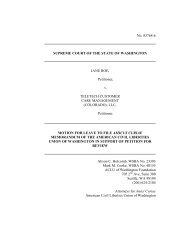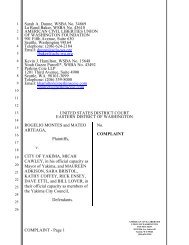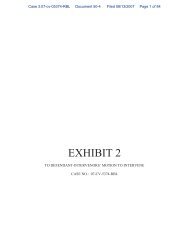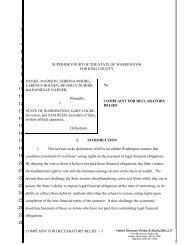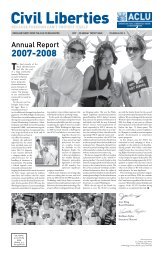BERGER v. CITY OF SEATTLE - ACLU of Washington
BERGER v. CITY OF SEATTLE - ACLU of Washington
BERGER v. CITY OF SEATTLE - ACLU of Washington
You also want an ePaper? Increase the reach of your titles
YUMPU automatically turns print PDFs into web optimized ePapers that Google loves.
<strong>BERGER</strong> v. <strong>CITY</strong> <strong>OF</strong> <strong>SEATTLE</strong><br />
221<br />
The Seattle Center’s permit rule is not comparable to the<br />
overbroad and untailored licensing ordinance invalidated by<br />
the Court in Watchtower Bible and Tract Society <strong>of</strong> New York,<br />
Inc. v. Village <strong>of</strong> Stratton, 536 U.S. 150 (2002). 15 There, the<br />
Court invalidated an ordinance requiring any solicitor or canvasser<br />
to obtain prior permission before going on private<br />
property to promote a cause and to carry a permit on his or<br />
her person. 16 536 U.S. at 155. The Court found that the permit<br />
scheme unduly broad and without relationship to a valid government<br />
objective.<br />
The dissent argues that we have “badly misread[ ] Charleston.” Dissent<br />
at 254 n.6. However, the dissent’s note only reaffirms our interpretation.<br />
Id. (“It emphasized that any ‘legislative body’ crafting a permit requirement<br />
‘should tailor that requirement to ensure that it does not burden small<br />
gatherings posing no threat to the safety, order, and accessibility <strong>of</strong> streets<br />
and sidewalks.’ ”). The quote cited by the dissent shows that the court in<br />
Charleston did not create a rule based on individuals or large groups but<br />
based on the groups’ or individuals’ effect on “safety, order, and accessibility<br />
<strong>of</strong> streets and sidewalks.” Id.<br />
15 Berger did not contend that Watchtower should guide our analysis,<br />
and his brief stated: “At most, Watchtower supports the district court’s<br />
determination that it was not necessary to reach the issue [<strong>of</strong> the validity<br />
<strong>of</strong> the badge requirement] where the permit system has been invalidated.”<br />
However, the case helps illuminate the sort <strong>of</strong> licensing scheme that would<br />
exceed constitutional bounds and provides an apt contrast with the Seattle<br />
Center’s permit scheme.<br />
16 The Court found it “unnecessary” to determine whether a lower standard<br />
<strong>of</strong> review would apply to a restriction on private property than in a<br />
public forum. See Watchtower, 536 U.S. at 164. Chief Justice Rehnquist<br />
assailed the majority on this score: “It is not clear what test the Court is<br />
applying, or under which part <strong>of</strong> that indeterminate test the ordinance<br />
fails.” Id. at 175 (Rehnquist, C.J., dissenting). “The Court suggests that<br />
[the city’s] regulation <strong>of</strong> speech warrants greater scrutiny [than that<br />
applied to restrictions in public forums in Ward, 491 U.S. at 791, and<br />
Thomas, 534 U.S. at 122]. But it would be puzzling if regulations <strong>of</strong><br />
speech taking place on another citizen’s private property warranted greater<br />
scrutiny than regulations <strong>of</strong> speech taking place in public forums. . . .”<br />
Watchtower, 536 U.S. at 176.



